
09 Jul SLAPP: More Than a Slap
“People in Serbia have continuously been under a state of emergency since 2020”, comments a participant at the Right(s) Therapy support group session, discussing human rights in Serbia and organized by the KROKODIL Association for the second time in a row, as part of its 17th festival, once again in front of the Museum of Yugoslavia.
This activity was designed to provide psychosocial and peer support for activists, journalists, female rights defenders, LGBT+ individuals, and other marginalized groups. Support groups serve as safe spaces where members can share experiences, discuss challenges, and develop strategies for coping with stress, threats, and burnout often faced by human rights defenders and advocacy professionals.
The groups facilitate peer-to-peer learning, emotional resilience, and mutual encouragement, with the ultimate goal of strengthening the well-being and capacity of these key actors in the human rights sector.
The second in a row Right(s) Therapy highlighted testimonials of people who have experienced firsthand what it means to fight for justice and human rights, exposing corruption – stories that have cost them dearly. Journalists, young activists, NGO representatives, and other human rights defenders shared their experiences and situations where their rights were threatened or violated, including illegal surveillance, arbitrary arrests, SLAPP lawsuits, defamation campaigns on social media and in the press. These aren’t just attacks on their fundamental rights – they are also attempts to intimidate and silence activists and citizens operating in the public sphere.
The event started with the presentation of the annual report by the Belgrade Centre for Human Rights on the state of human rights in Serbia in 2024. This is the 27th annual report, providing an overview of the human rights situation in the country, along with an analysis of legal frameworks and practices, continuously published since 1998. Moderated by Dušan Pokuševski, editor of the Report and programming director of the Belgrade Centre for Human Rights, and Marija Drndić from KROKODIL, with support from human rights experts, participants tried to answer key questions: How do we defend ourselves? How does this affect our daily lives? Are there institutions that truly help us? And what drives us to keep going instead of giving up?
As Dušan Pokuševski pointed out during the session, there are numerous annual reports by the Belgrade Centre for Human Rights that document violations of rights in Serbia. Compared to European standards, human rights here are still seriously at risk, especially regarding freedom of expression, media freedom, and the situation of marginalized groups such as people with disabilities, LGBT individuals, women, migrants, and asylum seekers.
Many participants shared with the group their stories where they felt unsafe, threatened by police, isolated, scared, injured, and traumatized – feelings of real people who endured great suffering in the fight for a better future. These are not just stories; they are lived experiences. Assaults, intimidation, kidnapping, extortion – these could happen to anyone today, at any blockade or protest. All of them endure this pressure out of their desire for a better world, as they state.
When discussing human rights violations and how these stories are presented, as listeners or readers, we often lack empathy; to us, it’s just statistics. But the reality is different: KRIK journalist and editor Stevan Dojčinović faces 20 SLAPP lawsuits, and nearly every BIRN journalist has at least one lawsuit, along with many investigative and other journalists. Additionally, numerous activists and students, including members of the STAV group, have dozens of lawsuits behind them – they have been in exile for months.
SLAPP, or Strategic Lawsuits Against Public Participation, is a type of lawsuit or repression tactic used by those in power to intimidate citizens. These lawsuits are mostly baseless and aim to prevent journalists, activists, NGOs, and ultimately ordinary people from engaging in social activism, criticizing the system, or fighting for their rights. The plaintiffs often seek to prolong the legal process and push the accused into severe financial and psychological distress. Even after winning the lawsuit, victims often remain buried in enormous debts because legal proceedings can be very lengthy. The initiators of such lawsuits employ numerous tactics to make the trial as difficult and frustrating as possible, aiming to break the spirit of the defendant and discourage further social activism.
Victims often fall into what’s called SLAPP shaming – most commonly journalists who fear for their work and credibility. They hesitate to seek help or speak publicly about the lawsuits because they are afraid of public condemnation, even though the lawsuits are often unrelated to their professional integrity. This leads to self-censorship, which is precisely the goal of the plaintiffs. Such fears further hinder the collection of accurate statistics on SLAPP cases, as people are afraid to discuss them.
SLAPP cases mainly occur in corrupt countries and are not yet legally defined, as they are a new form of repression. According to the Daphne Caruana Galizia Foundation, Italy, Romania, Serbia, and Turkey are countries experiencing the greatest growth in SLAPP lawsuits. These lawsuits are most often initiated to uncover corruption and environmental issues. Corruption in our country also reaches into the courts, as evidenced in a situation when a judge sued the KRIK editorial team, as presented in the film SLAPPing in the Name of the People by Jelena Zorić of BIRN. Fighting SLAPPs can sometimes feel like fighting windmills, but the most important thing is not to lose the motivation to continue the fight.
Counteracting SLAPP lawsuits is possible. The Slavko Ćuruvija Foundation has published a SLAPP Guide – how to recognize it and what to do in such situations.
Through conversations with people present, it becomes clear that many do not perceive human rights violations as a real problem happening around them, but rather as statistics. Roberto Grujičić, a child psychiatrist and founder of the podcast Two and a Half Shrinks, stated at the KROKODIL festival, as part of the project Why Do You Say Love but Mean War, that “the normalization of violence occurs when violence no longer causes discomfort.” Social media and the press, with their relentless flood of aggressive content, contribute to this, leading to desensitization to violence, experts say.
One participant in the workshop remarked, “This isn’t the therapy I wanted, but maybe it was exactly what I needed”.
Andrea Poljak, KROKODIL’s journalist for a day.
The Right(s) Therapy 2.0 is implemented with financial support from the European Union. The content is solely the responsibility of the KROKODIL Association and does not necessarily reflect the official views of the European Union.
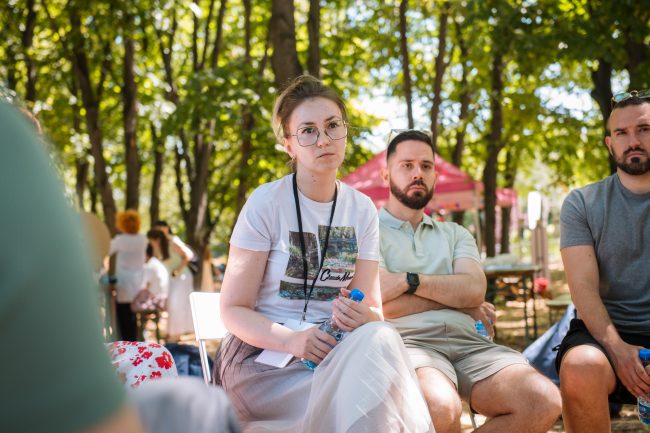
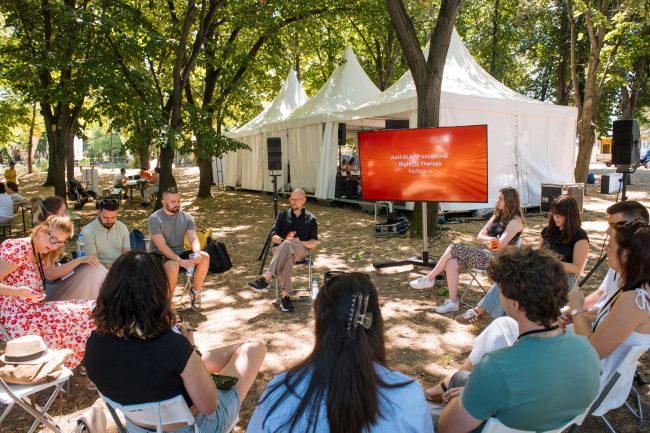
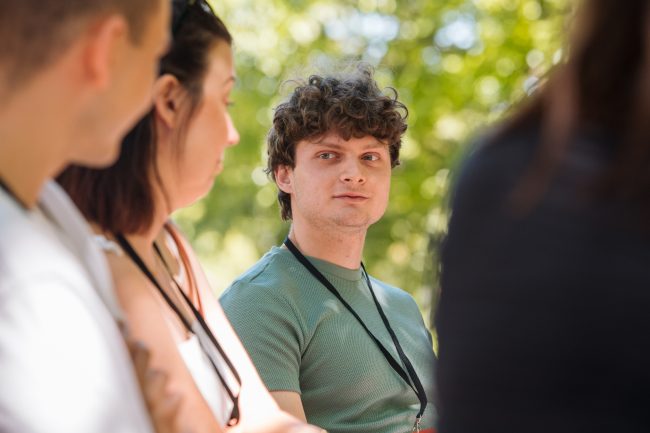
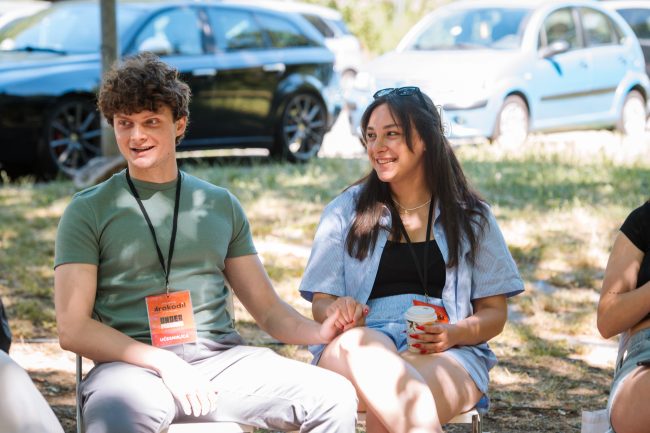
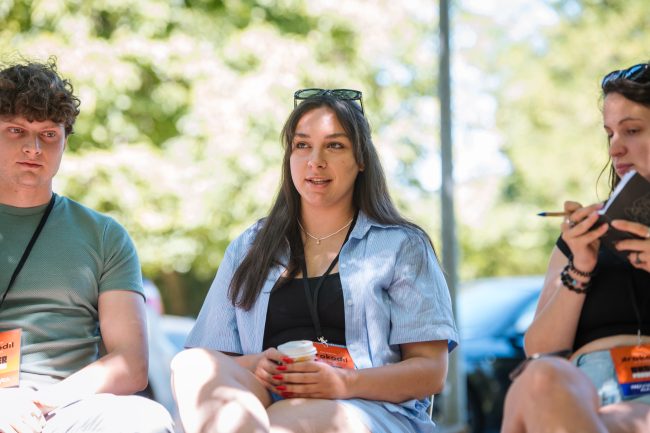
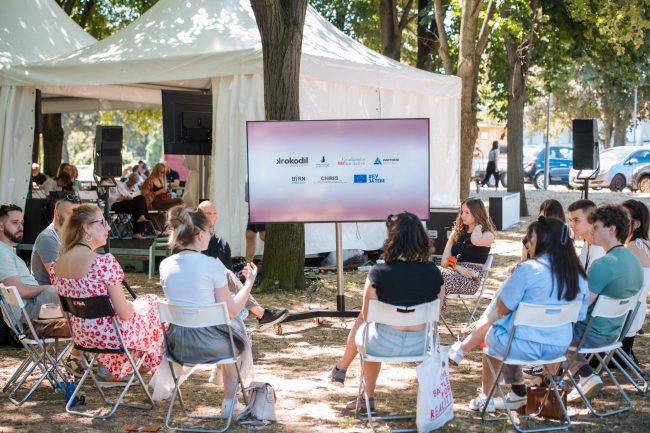
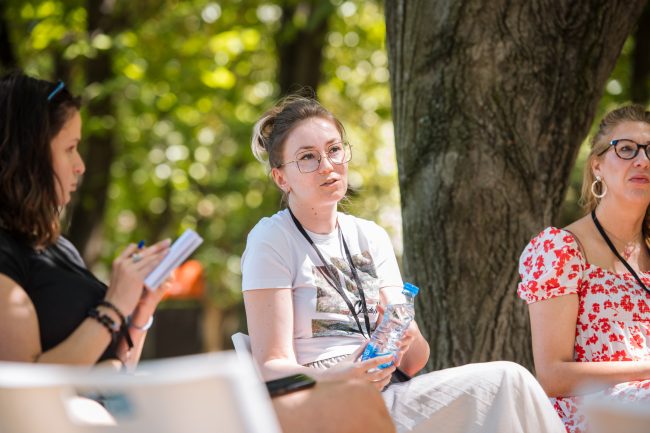



Sorry, the comment form is closed at this time.